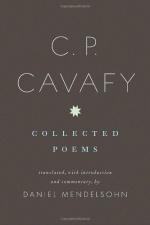|
This section contains 369 words (approx. 1 page at 400 words per page) |

|
"Ithaka" has long been recognized as one of Cavafy's finest poems, and one that expresses his outlook on life. It was first admired by T. S. Eliot, who published the first translation of "Ithaka" into English in his literary periodical Criterion in 1924. Since then, almost every writer on Cavafy has had something to say about the poem, which has appeared in at least four different English translations, each of which contains subtle differences.
Jane Lagoudis Pinchin, in Alexandria Still, evaluates the different translations of the poem, including the first published translation, by George Valassopoulo, and the translations by Rae Dalven and John Mavrogordato. Pinchin prefers Mavrogordato's version of the last line of the poem ("You will have understood the meaning of an Ithaka") to Dalven's version ("You must surely have understood by then what Ithacas mean"). Pinchin comments, "Dalven does sound a bit impatient with her...
|
This section contains 369 words (approx. 1 page at 400 words per page) |

|




